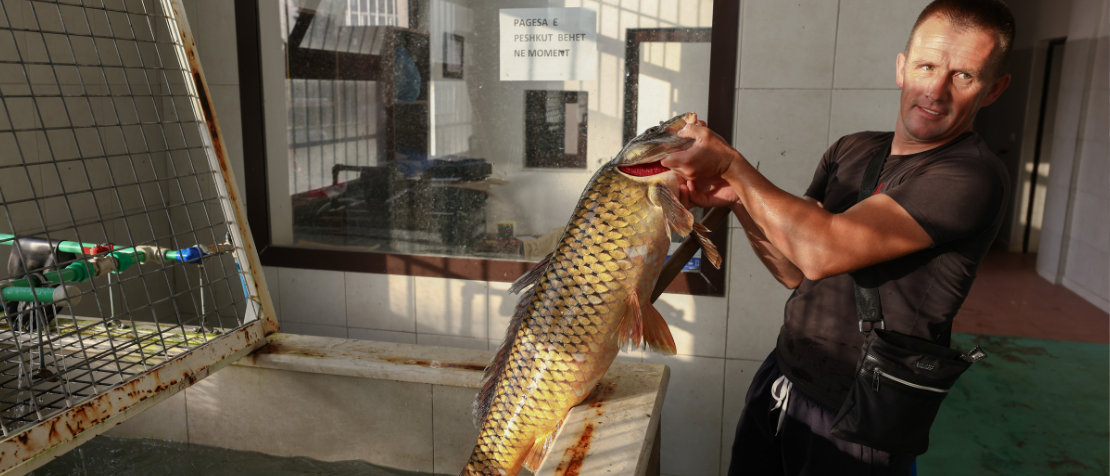FAO technical Commission reviews current issues of European fisheries and aquaculture sectors

©FAO/Franc Zhurda
The week of 7–11 October has been all about the European fisheries and aquaculture sectors in Pula, Croatia with the international symposium, "Building a sustainable future for inland fisheries and aquaculture in a time of multiple stressors" and the 32nd Session of the European Inland Fisheries and Aquaculture Advisory Commission (EIFAAC), held in back-to-back succession. The events brought together 120 policy makers and scientists who looked at the status and trends in European inland fisheries, potential for aquaculture growth, and the sectors’ sustainable future in a time of multiple stressors.
Established in 1957 as a regional fishery body of the Food and Agriculture Organization of the United Nations (FAO), EIFAAC promotes the long-term sustainable development, utilization, conservation, restoration and responsible management of European inland fisheries and aquaculture, consistent with the FAO Code of Conduct for Responsible Fisheries and other relevant international instruments.
Its membership is growing and now has 38 members with the recent accessions of North Macedonia, the Republic of Moldova, Serbia, and Slovenia.
At the Commission Session (9–11 October), members discussed recent opportunities and challenges for inland fisheries and aquaculture in their countries with the intention of defining and coordinating regional and international actions and solutions. The Commission adopted the EIFAAC work programme for the period 2025 to 2026 that should contribute to the implementation of FAO’s global Strategic Framework 2022–31 and the 2030 Agenda for Sustainable Development.
“Inland fisheries and aquaculture play an important role in providing healthy and nutritious food to the European population,” said Nabil Gangi, FAO Deputy Regional Representative for Europe and Central Asia at the opening of the Session. “FAO remains committed to provide its full support to EIFAAC and to each one of its members.”
He also noted that at ultimately the success of the Commission’s work depends on the efforts of the countries.
Ante Misura, Director at the Ministry of Agriculture, Forestry and Fisheries on behalf of the Government of Croatia, the host warned that "Striving to achieve sustainability of fisheries and aquaculture practices and improve the status of the resources and habitats requires a strong international forum, such as this one, for the exchange of information on biology and management, aquaculture, protection of aquatic resources and socioeconomic issues, both on scientific and decision-making level."
Inland fisheries and aquaculture in Europe
The total production of EIFAAC Members’ inland capture fisheries for 2022 was estimated to represent less than 1 percent of global inland fish production (including capture fisheries and aquaculture). Given that fish stocks are affected not only by fishing, in the past years, EIFAAC members have made efforts to coordinate activities and improve water quality, maintain and restore habitats, by also taking fish welfare into consideration.
At the Session, the Commission acknowledged the need for data collection, monitoring, and information systems and increasing capacity to better identify the status of inland fisheries and drivers of change, and to better inform decisions on the management and conservation of inland fisheries. Accurate data analysis will promote potential measures for increasing production and better manage inland fisheries, as well as integrated water resources management.
Aquaculture production in the EIFAAC area increased from 2 million tonnes in 2000 to nearly 3.6 million tonnes in 2022. As imports account for two thirds of EIFAAC member countries’ fish and seafood supply, and more than half of their fish and seafood is exported, there is a potential for aquaculture development in the area through expanding export markets and/or import substitution.
Related to this, the Commission acknowledged that freshwater aquaculture production by Commission Members has been stagnating over the last decades, while at a global level it increased by 5 percent on average annually over the last 10 years. EIFAAC encourages its Members to promote consumption of freshwater capture fisheries and aquaculture products in their domestic markets. In addition, EIFAAC will also facilitate a “blue transformation” of aquatic food systems for food security, nutrition, and resilient livelihoods.
International symposium for a sustainable future
Prior to the EIFACC Session, intense discussions took place at the international symposium on “Building a sustainable future for inland fisheries and aquaculture in a time of multiple stressors”. Topics included stock assessment and freshwater fish management, the development and challenges to freshwater aquaculture in areas such as technology, environment, economic and the circular economy, the problems and conservation of migratory fishes, invasive freshwater species, the use of artificial intelligence, and the impacts of climate change. Participants also discussed innovations in the management of freshwater areas and aquatic biodiversity, advances in recreational fisheries research and management, and the socio-economic aspects of freshwater fishery and aquaculture.
European Inland Fisheries and Aquaculture Advisory Commission (EIFAAC)
The European Inland Fisheries and Aquaculture Advisory Commission – Supporting a Blue Transformation in Europe 2024
32nd Session of the European Inland Fisheries and Aquaculture Advisory Commission (EIFAAC)
Blue transformation

